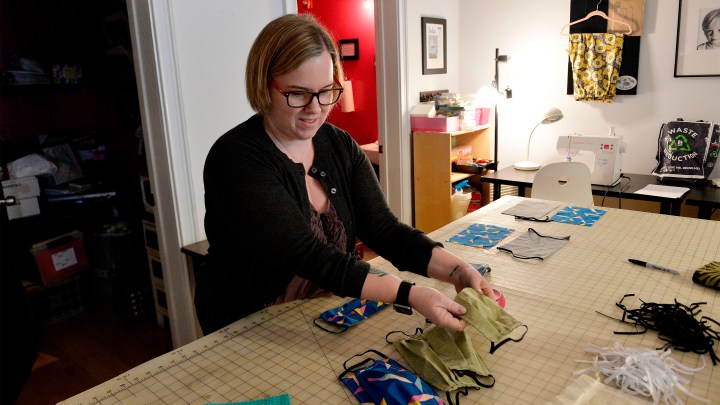
How to choose a cloth face mask (and avoid the long wait for it)

As states reopen, governments and businesses are asking (and often requiring) residents to wear face masks. And as we have reported, there are dozens of companies stepping in to sell them. But it can be hard to know what you’re getting, whether it will be effective, and whether it will arrive at all.
At Marketplace, we are all trying to get our hands on masks, too. Here’s what we’ve learned.
Choosing a mask
Cloth face masks can protect us from each others’ expulsions — large spit droplets or sprays from a wayward cough or sneeze. But how effective a mask is depends, in part, on the fabric.
There’s a helpful and detailed write-up on all this by Dr. Susan L. Sokolowski at the University of Oregon and Dr. Karen L. LaBat at the University of Minnesota, who both research personal protective equipment.
Some takeaways: Look for masks that have multiple layers, made from fabrics that are easy to wash and tightly woven, with a high yarn count. Bonus points if the fabric has an antimicrobial or water repellent finish, especially for the outer layer. It is also helpful if the mask has a pocket for a disposable filter.
What can you use as a filter? Sokolowski suggests stacking 2-3 coffee filters or using non-woven interfacing (a fabric used to stabilize collars, waists, and cuffs on garments).
The mask should also fit tightly around your nose and mouth. Look for a mask with adjustable straps and a metal piece that pinches around the nose.
If yours has elastic ear loops, it might be too loose. That happened to several of us.
The good news: you can alter it. I stitched the elastic on mine.



Lastly, do some research on the seller before you buy.
In the early days of this pandemic, I ordered surgical masks from a third party seller on Amazon, and I never received them. I reached out to the seller multiple times but never heard back. I ended up getting a chargeback from my credit card company.
Something similar happened to Mitchell Rosen, father of Marketplace podcast producer Peter Balonon-Rosen. He ordered 100 masks on Amazon and they never arrived. Fortunately, his credit card was never charged.
And scams are not just happening on Amazon:
Before you order masks, Google the company’s name. Search for it on the Better Business Bureau’s scam tracker, which is full of mask scam stories. Read reviews. And if you have doubts or questions, email the seller.
Dealing with delays
A lot of people who ordered cloth masks a month ago still haven’t received them.
On April 20, I ordered a few cloth masks and filters from the online retailer Vida. I got this email on May 5:
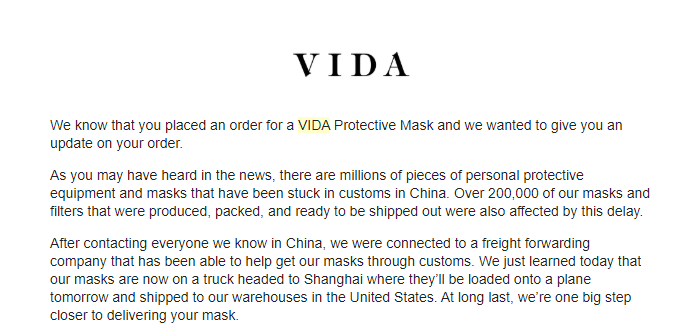
The email also included a 30% discount code and said I would be refunded for shipping costs. Vida also said it is trying to partner with U.S. factories for future orders. I haven’t received the masks yet.
In April, I also ordered a mask from Rendall Co., a workwear retailer in Los Angeles. Eleven days later, I got this note:
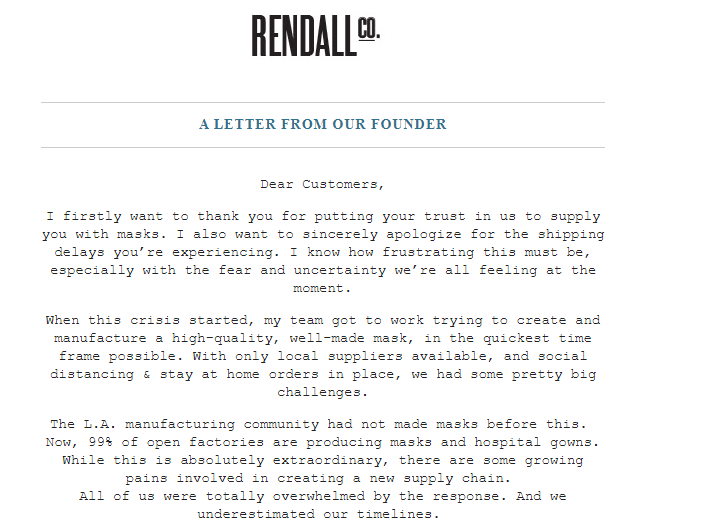
The email said that Rendall Co. has started working with three new factories and a local distribution center to speed up shipments, and it included a 20% discount code. I haven’t received the mask yet.
Also in April, Marketplace Senior VP and General Manager Deborah Clark ordered four cotton face masks on Etsy. The masks were supposed to be shipped in two to seven days. More than two weeks later, the seller told her there was a delay with the fabric she wanted. The masks just arrived.
Another example: our Senior Tech Editor/Producer Michael Lipkin ordered masks from the menswear brand Buck Mason in early April. They just arrived, more than a month later.
I spoke with Erik Allen Ford, co-founder of Buck Mason, this week. He said orders are running about a week behind and that the company is making masks for the first time, so there’s been a lot to figure out. Demand has also been high. For context, Buck Mason typically makes about 750,000 T-shirts a year, he said. It has made 400,000 face masks in six weeks.
One tip: consider buying local. Michael ordered masks from a local seller on Etsy. He picked them up the next day.
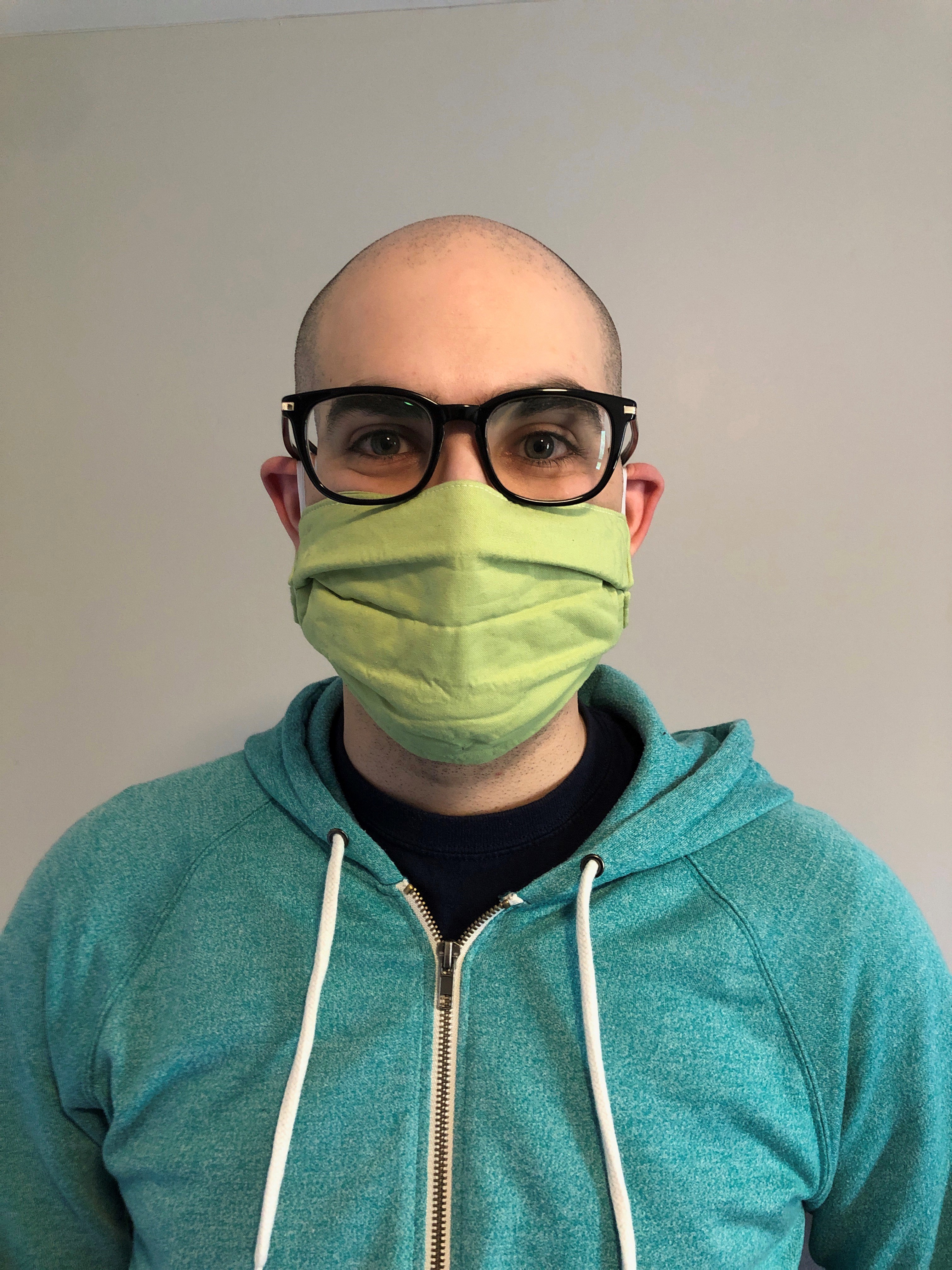
And I bought masks from a company called Tembo NYC. They were hand-sewn in Queens and arrived in days.
Lastly, just because you get an email saying your masks have “shipped” doesn’t mean they actually have. Several of us have gotten those emails and later been told by sellers that it simply means a shipping label was created.
Makeshift masks
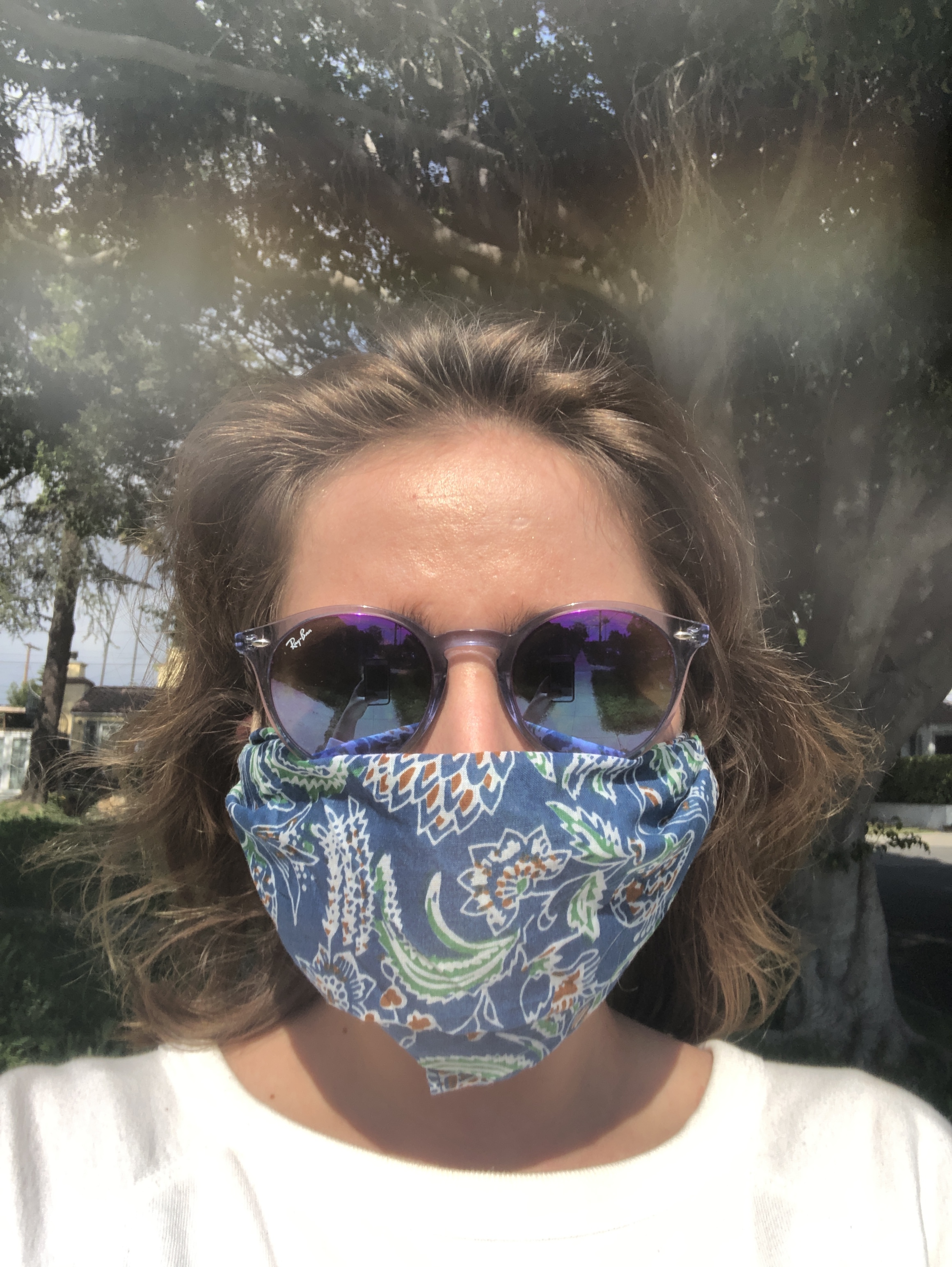
Because of delays, lots of people have had to cobble together their own makeshift face coverings, using items like dish towels, eye masks, and socks.
Hayley Hershman, a producer for our podcast “This is Uncomfortable,” made a mask from a scarf and a couple hair ties.
Make-your-own-mask tutorials abound.
Also, NPR’s Maria Godoy put together a video with some tips on how to make whatever face covering you have more effective.
Oh, and remember: experts say any face covering is better than nothing.
Also, no matter what mask you wear, you should still keep your distance and wash your hands.
Tell us about your experience buying or making face masks.
There’s a lot happening in the world. Through it all, Marketplace is here for you.
You rely on Marketplace to break down the world’s events and tell you how it affects you in a fact-based, approachable way. We rely on your financial support to keep making that possible.
Your donation today powers the independent journalism that you rely on. For just $5/month, you can help sustain Marketplace so we can keep reporting on the things that matter to you.


















